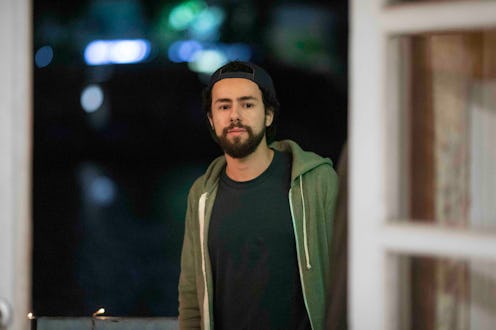Entertainment
'Ramy' Is A Rare First-Generation Comedy About Finding Religion — Not Leaving It Behind

Across film and TV, there have been a number of stories about young, first-generation Americans navigating the chasm between their two cultures. Often — and particularly when they come from strict, religious upbringings — that involves them rebelling against their parents' roots and adopting a more agnostic, Americanized way of life. We saw it in Master of None. We saw it in The Big Sick. But that wasn't the story Ramy Youssef, co-creator and star of Hulu's Ramy, wanted to tell.
"I felt like I've seen a lot of stories of people coming from religious backgrounds or from another culture [growing up] in America, and their goal is to kind of erase as much as they can of where they come from ... [it's] almost like they kind of just want to be white," he tells Bustle. "And I think that that might be some people's stories, but it wasn't my story. My story has always been, for me, trying to really synthesize as opposed to erase. Trying to include these things, and really deal with what might be a little complicated."
In the show, Youssef plays Ramy, a kind of aimless 20-something coming of age in suburban New Jersey. He's a first-generation Egyptian immigrant, and was raised as a Muslim — a religion his character genuinely believes in, but is struggling to mesh with the other aspects of his life. He goes to a mosque to pray, but is careless about the washing that must be done beforehand. He has sex outside of marriage, but abstains during Ramadan. And he goes to bars and parties, but doesn't drink or experiment with drugs (or rather, he tries not to). For Ramy, being a faithful Muslim while still fitting in with the people around him is a continuous internal conflict.
"I believe in God. I really do, man," Youssef's character says, frustrated, in the first episode. "And yeah, I have sex even though I'm not married, and I'm probably gonna try mushrooms one day. So what? That means I'm not a good Muslim? I can't do it because I don't follow all the rules and all the f*cking judgments that are always being put on us? ... I'm just, like, trying to be good."
As Youssef explains, exploring this space isn't meant to make Ramy a how-to for being a "good Muslim" amid a generation in which God can often feel like "a dirty word" — nor is it meant to be a preachy endorsement for the religion. His character has a sexist, anti-Semitic uncle; his parents hold his sister to higher standards simply because she is a woman; and Ramy harbors several of his own skewed, implicit views. It's a messy, unfiltered look at being a young Muslim American, but one that, for Youssef, is honest and overdue.
"Religion as an institution, and as a culture, has been horrible... and I don't blame anybody for feeling [opposed to it]," he concedes. "[But I wanted to] provide a narrative where it's like, 'Look, we're acknowledging all those faults and all those things. But at the same time, there is still faith, and there's still this feeling, and this character still believes in that and wants to chase that.' That is something that I always wished I could see. And I'm really happy to be able to provide an imperfect version of that."
Youssef is also clear that Ramy isn't a show about "the Muslim experience," but his Muslim experience. "The show's called Ramy, and that's very deliberate," he says, noting that while there is some overlap between him and his character, it's not a direct re-creation of his life. "You know, it's not because I wanted to see my name on billboards, it's because I wanted to be really clear that that's all I can claim to cover, is my point of view."
Ultimately, Youssef's intention is to show a perspective he feels hasn't been represented, and to open a dialogue about the different ways Muslim Americans engage with their religion — even if that means leaning into the more complicated, touchier parts of it.
"Everything gives me pause," Youssef says when asked if he's nervous about the reaction to the show. "Everything gives me pause, and then I press play again."